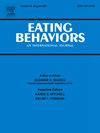Preventing weight gain in adults who emotionally eat: An open pilot
IF 2.4
3区 医学
Q2 PSYCHIATRY
引用次数: 0
Abstract
Background
Weight gain prevention is a critical component of comprehensive obesity care. Emotional eating may contribute to unwanted weight gain, increasing cardiometabolic risk factors among adults with obesity. One way to help reduce emotional eating and reduce weight gain is to provide instruction in Appetite Awareness Training (AAT).
Purpose
The purpose of this open pilot study was to examine the feasibility and acceptability of the SATISFY intervention, a 12-week intervention consisting of AAT and training from the Diabetes Prevention Program in a sample of Black and White adults with obesity, and who report emotional eating.
Methods
Eligible adults participated in 12 virtual weekly 60–90-minute group sessions. The intervention included content from AAT and the Diabetes Prevention Program. Participants also received weekly feedback on weight and eating behavior trends via a digital health platform. Participants were assessed at 0, 3 (T1), and 6 months (T2).
Results
At baseline, participants (N = 31) had a mean (±SD) age of 47.55 ± 12.41 years, BMI of 36.6 ± 6.6 kg/m2 and moderate levels of emotional eating. Participants attended approximately 50 % of sessions and 77 % of participants were retained at six months. Reductions in emotional eating subscales, disinhibition, and improvements in interoceptive awareness were observed, with participants also largely maintaining their weight from T1–T3. Finally, participants reported moderate to moderately high acceptability scores.
Conclusion
The results of this study provide evidence about the feasibility, acceptability, and potential of the SATISFY program to help participants with emotional eating maintain their weight.
防止情绪化进食的成年人体重增加:一个开放的试点
预防体重增加是肥胖症综合治疗的关键组成部分。情绪化进食可能会导致不必要的体重增加,增加肥胖成年人的心脏代谢风险因素。帮助减少情绪化进食和减少体重增加的一种方法是提供食欲意识训练(AAT)的指导。目的:本开放试点研究的目的是检验SATISFY干预的可行性和可接受性,这是一项为期12周的干预,包括糖尿病预防计划的AAT和培训,在患有肥胖的黑人和白人成年人中进行,并报告情绪性饮食。方法符合条件的成年人参加了12个虚拟的每周60 - 90分钟的小组会议。干预包括来自AAT和糖尿病预防计划的内容。参与者还通过数字健康平台每周收到有关体重和饮食行为趋势的反馈。在0、3 (T1)和6个月(T2)时对参与者进行评估。结果基线时,参与者(N = 31)的平均(±SD)年龄为47.55±12.41岁,BMI为36.6±6.6 kg/m2,情绪性饮食水平中等。参与者参加了大约50%的会议,77%的参与者在六个月后保留了下来。观察到情绪进食亚量表、去抑制和内感受意识的改善有所减少,参与者也在很大程度上保持了T1-T3的体重。最后,参与者报告了中等到中等高的可接受性得分。结论本研究的结果为“满足”项目帮助情绪性进食参与者保持体重的可行性、可接受性和潜力提供了证据。
本文章由计算机程序翻译,如有差异,请以英文原文为准。
求助全文
约1分钟内获得全文
求助全文
来源期刊

Eating behaviors
Multiple-
CiteScore
4.20
自引率
3.60%
发文量
65
审稿时长
60 days
期刊介绍:
Eating Behaviors is an international peer-reviewed scientific journal publishing human research on the etiology, prevention, and treatment of obesity, binge eating, and eating disorders in adults and children. Studies related to the promotion of healthy eating patterns to treat or prevent medical conditions (e.g., hypertension, diabetes mellitus, cancer) are also acceptable. Two types of manuscripts are encouraged: (1) Descriptive studies establishing functional relationships between eating behaviors and social, cognitive, environmental, attitudinal, emotional or biochemical factors; (2) Clinical outcome research evaluating the efficacy of prevention or treatment protocols.
 求助内容:
求助内容: 应助结果提醒方式:
应助结果提醒方式:


